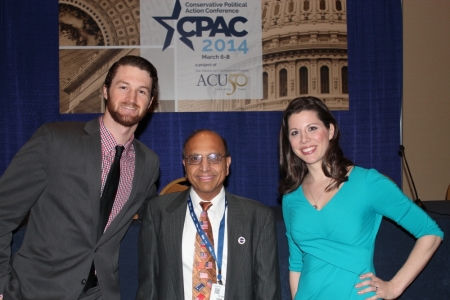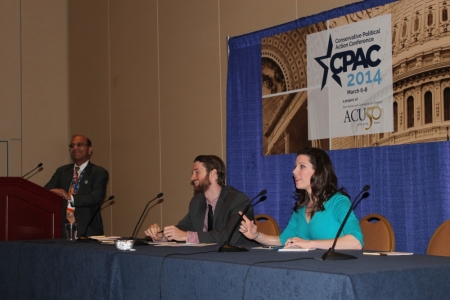Marijuana Legalization Debate: 'Do We Really Need More Dumb People?'

NATIONAL HARBOR, Md. – A panel on marijuana legalization led to a spirited debate on the social costs of drug use and the drug war at the Conservative Political Action Conference on Thursday.
"Marijuana makes people dumber, do we really need more dumb people right now?" asked Chris Beach, executive producer of Bill Bennett's show "Morning in America." Beach passionately argued that the effort to crack down on marijuana and other drugs is worth the cost to taxpayers. He insisted that America is falling behind in terms of education and "I don't think it's going to help us catch up to legalize marijuana."
Mary Katharine Ham, editor-at-large of HotAir.com and winner of CPAC's "Blogger of the Year" award, vehemently declared that the drug war is not worth the social and economic costs, especially to minority youth. "The weed itself is less damaging than the criminal justice system can be to a young person, certainly of low economic status," Ham told CP in an interview following the panel.
During the panel, Ham recalled growing up in public schools that had a majority of black students. In her personal experience, she said that "young black offenders are much more likely than white offenders" for possessing, dealing, and smoking pot. She witnessed firsthand that "that process was far more damaging than smoking weed every now and then."
Statistics
Nevertheless, Beach presented concrete numbers to back up the value of the drug war. Referring to Bill Bennett's two years as "the first Drug Czar," or director of the Office of National Drug Control Policy, Beach listed decreasing statistics on cocaine and marijuana use among children.
In 1979, 10 percent of kids smoked cocaine, while in 1994, less than one percent did. In 1979, 39 percent used marijuana, but that number dropped to 12 percent in 1994. Similarly, he argued that the number of murders related to drugs also decreased – from 6 percent to 3.5 percent – during that period.
Ham still condemned the crackdown on drugs as a "bad investment," arguing that it is not worth the billions of dollars the government spends. She did not argue against the negative effects of marijuana, but claimed that adults should be able to make the decision for themselves, as they do with alcohol.
Ham also cited crime statistics on marijuana. "750,000 people every year are arrested for marijuana, 87 percent of them for possession," and "the criminal justice system is very tough," she insisted. While she did not counter Beach's argument that "less than 1 percent of the prison population are imprisoned for possession," she argued that "the state can really mess you up without putting you in prison." Ham pointed out that finding a job can prove especially difficult for convicted felons, and that once someone identifies as a criminal it is more likely they will choose to commit other crimes.
Black Markets
The "Blogger of the Year" also argued that if marijuana is legalized, cartels will lose power, because the cost to own and smoke marijuana will decrease and the profits drug dealers make will also go down. Since there will no longer be a "black market" for marijuana, the free market will adjust the costs to fit supply to demand in a more equitable fashion.
Colorado State Representative Janak Joshi (R-Colorado Springs) admitted that cartels have already moved into the Centennial State, despite the legalization of marijuana. "We passed the tax on marijuana – it's going to be 25 percent," he declared. While Joshi projected that the tax will raise $18 million, half of which will go to schools, this move will also increase the cost of legal marijuana, reintroducing a black market for the drug.
Beach emphasized this point, and argued that drug legalization will not dismantle the power of cartels, especially those in Mexico, whose violence often spreads across the border. "Mexican cartels are making millions off of bootlegged DVDs, which are completely legal," he decalred.
During the question and answer session, audience members took an active part, with some becoming irate to prove their points. Leo Dymowski, Libertarian candidate for Attorney General in Maryland, insisted that drug legalization in Portugal has proven a complete success. Beach countered that Portugal has "one of the highest drug violence rates in Europe." Later on, Matthew Feeney, assistant editor of Reason Magazine, reintroduced the topic, repeating Dymowski's point that Portugal has a very low violent crime rate.
Finding Common Ground

Despite her support for marijuana legalization and the experiment in Colorado and Washington, Mary Katharine Ham insisted that she never plans to use the drug. "You can be pro-freedom without actually employing that freedom in your life," she explained. Ham also said she supported private drives and publicity campaigns opposing marijuana use – especially for children.
Beach also found common ground, emphasizing the value of America's federalist system, where different laws can be tested in different states. "The beauty of America is that the states can experiment with this," he stated. "My worry is that we're going to add a third dangerous substance to alcohol and tobacco in marijuana."






















